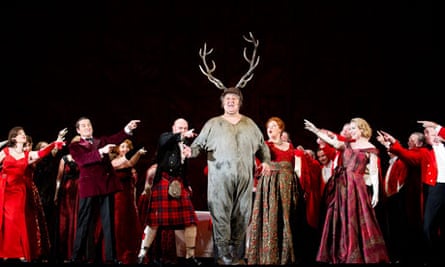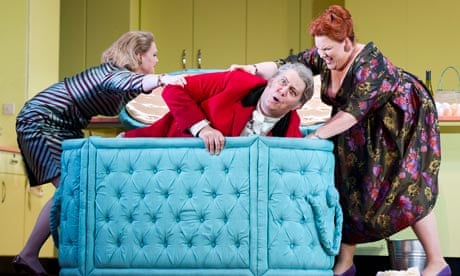Since it pensioned off Franco Zeffirelli's naturalistic 1960s production of Falstaff, Covent Garden has struggled to find a successor that could successfully capture the many qualities of Verdi's late masterpiece. Robert Carsen's new staging is the Royal Opera's third post-Zeffirelli effort and, while this one may not endure for decades either, in some ways it is the house's best shot so far.
Carsen sets Falstaff in a posh, postwar, panel-lined country hotel, inhabited by conservative hunting chaps in plus-fours and handsome women in glamorous New Look frocks. The fat knight racks up his room service bill and behaves like a cad in the smoking room, while Bardolph and Pistol pocket the dining room silver and the lady diners' handbags. Alice Ford's home, by contrast, is 1950s gaudy gadget heaven. There's not a hint of Windsor or its forest, but there is a notable (and distracting) cameo for a horse. The production also lacks the unerring wit and sense of place and period that marked Richard Jones's similar updating of the piece for Glyndebourne, with which Carsen's staging will inevitably be compared.

Carsen has a musical grasp of the piece, though, and he understands that Falstaff is more than a romp. Everything sung by the young lovers Fenton and Nannetta (Joel Prieto and Amanda Forsythe, both excellent) is carefully set apart from the onrushing tumult elsewhere, just as Verdi's score indicates, while Ford's jealousy monologue, muscularly delivered by Dalibor Jenis disguised as a good ol' boy tourist, is effectively cradled in an eerie half-light. These are rare moments of intimacy in what is too grand and frantic a production.
Vocally, standards are uniformly good rather than remarkable, but then Falstaff is an ensemble opera rather than a star vehicle. In the title role, Ambrogio Maestri may lack the vocal allure of some of his predecessors, but he is confident and sympathetic, subtle of tone when needed, and certainly looks the part when he goes wooing in his full hunting regalia. Ana María Martínez is a bright-voiced and sexy Alice, a natural leader of women, and Marie-Nicole Lemieux ticks lots of boxes as Mistress Quickly.
In the pit, Daniele Gatti's conducting is less conventionally Italianate than a touch Germanic – with shades, not always convincingly, of Carlo Maria Giulini's 1980s performances. There is lots of attention to dark orchestral detail, and Gatti seemed keen to underline that Falstaff is the work of a composer who knew his Wagner. That is fair enough, given there is even a discreet quote from Parsifal, which Gatti has conducted at Bayreuth, near the start of the final act.

Comments (…)
Sign in or create your Guardian account to join the discussion